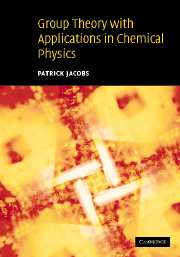Book contents
- Frontmatter
- Contents
- Preface
- Notation and conventions
- 1 The elementary properties of groups
- 2 Symmetry operators and point groups
- 3 Matrix representatives
- 4 Group representations
- 5 Bases of representations
- 6 Molecular orbitals
- 7 Crystal-field theory
- 8 Double groups
- 9 Molecular vibrations
- 10 Transitions between electronic states
- 11 Continuous groups
- 12 Projective representations
- 13 Time-reversal symmetry
- 14 Magnetic point groups
- 15 Physical properties of crystals
- 16 Space groups
- 17 Electronic energy states in crystals
- 18 Vibration of atoms in crystals
- Appendices
- References
- Index
6 - Molecular orbitals
Published online by Cambridge University Press: 10 December 2009
- Frontmatter
- Contents
- Preface
- Notation and conventions
- 1 The elementary properties of groups
- 2 Symmetry operators and point groups
- 3 Matrix representatives
- 4 Group representations
- 5 Bases of representations
- 6 Molecular orbitals
- 7 Crystal-field theory
- 8 Double groups
- 9 Molecular vibrations
- 10 Transitions between electronic states
- 11 Continuous groups
- 12 Projective representations
- 13 Time-reversal symmetry
- 14 Magnetic point groups
- 15 Physical properties of crystals
- 16 Space groups
- 17 Electronic energy states in crystals
- 18 Vibration of atoms in crystals
- Appendices
- References
- Index
Summary
Hybridization
In descriptions of chemical bonding, one distinguishes between bonds which do not have a nodal plane in the charge density along the bond and those which do have such a nodal plane. The former are called σ bonds and they are formed from the overlap of s atomic orbitals on each of the two atoms involved in the bond (ss σ bonds) or they are sp or pp σ bonds, where here p implies a pz atomic orbital with its lobes directed along the axis of the bond, which is conventionally chosen to be the z axis. The overlap of px or py atomic orbitals on the two atoms gives rise to a π bond with zero charge density in a nodal plane which contains the bond axis. Since it is accumulation of charge density between two atoms that gives rise to the formation of a chemical bond, σ or π molecular orbitals are referred to as bonding orbitals if there is no nodal plane normal to the bond axis, but if there is such a nodal plane they are antibonding orbitals. Carbon has the electron configuration 1s2 2s2 2p2, and yet in methane the four CH bonds are equivalent. This tells us that the carbon 2s and 2p orbitals are combined in a linear combination that yields four equivalent bonds. The physical process involved in this “mixing” of s and p orbitals, which we represent as a linear combination, is described as hybridization.
- Type
- Chapter
- Information
- Group Theory with Applications in Chemical Physics , pp. 106 - 130Publisher: Cambridge University PressPrint publication year: 2005

